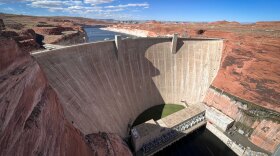-
Arizona Gov. Katie Hobbs, California Gov. Gavin Newsom and Nevada Gov. Joe Lombardo released a joint statement Saturday calling on Utah, Colorado, Wyoming and New Mexico to offer more concessions.
-
Negotiators are focusing on a five-year agreement for sharing water from the shrinking river. Experts say that would provide some much-needed flexibility.
-
State negotiators entered the meeting at a years-long impasse over how water restrictions should be managed during dry years. They now have less than two weeks until a federal Feb. 14 deadline.
-
Water leaders in the U.S. West gathered this week in Las Vegas with a hefty task hanging over their heads — figuring out a long-term plan for sharing water from the Colorado River.
-
Utah and the 6 states that share the river missed a federal Nov. 11 deadline to make progress on a new water agreement. Gov. Katie Hobbs said she has a hard time believing the Upper Basin states can't reduce water use.
-
A Border Patrol takeover of local leadership could bring more aggressive tactics to the region, like what federal agents have done in Los Angeles and Chicago, said a Nevada immigration law professor.
-
A group of nonprofits is calling for reductions to water demand, changes at Glen Canyon Dam and more transparent negotiations.
-
The announcement Friday by federal officials means Arizona will again go without 18% of its allocation, while Mexico loses 5%. The reduction for Nevada will stay at 7%
-
There's more going on in trees than what most of us may know. Experts explain the science of trees.
-
On July 16, 1945, the U.S. detonated the first nuclear bomb. In the years that followed, other tests led to a wave of health problems in Utah and across the West. Now, advocates are celebrating the expansion of the Radiation Exposure Compensation Act.
-
Colorado River states appear to be coalescing around the early makings of a new plan to share water in a way that accounts for climate change.
-
Cooke is the former manager of the Central Arizona Project. Regional water experts regard him as a qualified expert.
Play Live Radio
Next Up:
0:00
0:00
Available On Air Stations












